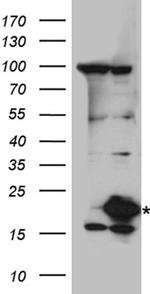Search Thermo Fisher Scientific
FIGURE: 1 / 2
UBE2L3 Antibody (TA890154) in WB


Product Details
TA890154
Species Reactivity
Host/Isotype
Class
Type
Immunogen
Conjugate
Form
Concentration
Purification
Storage buffer
Contains
Storage conditions
Shipping conditions
Target Information
The modification of proteins with ubiquitin is an important cellular mechanism for targeting abnormal or short-lived proteins for degradation. Ubiquitination involves at least three classes of enzymes: ubiquitin-activating enzymes (E1s), ubiquitin-conjugating enzymes (E2s) and ubiquitin-protein ligases (E3s). UBE2L3 is a member of the E2 ubiquitin-conjugating enzyme family. This enzyme is demonstrated to participate in the ubiquitination of p53, c-Fos, and the NF-kB precursor p105 in vitro.
For Research Use Only. Not for use in diagnostic procedures. Not for resale without express authorization.
References (0)
Bioinformatics
Protein Aliases: E2 ubiquitin-conjugating enzyme L3; L-UBC; UbcH7; UbcM4; Ubiquitin carrier protein L3; ubiquitin conjugating enzyme E2L 3; ubiquitin-conjugating enzyme 7; Ubiquitin-conjugating enzyme E2 L3; Ubiquitin-conjugating enzyme E2-F1; ubiquitin-conjugating enzyme E2L 3; ubiquitin-conjugating enzyme UBCH7; Ubiquitin-protein ligase L3
Gene Aliases: C79827; E2-F1; L-UBC; UBCE7; UBCH7; UbcM4; UBE2L3
UniProt ID: (Human) P68036, (Mouse) P68037
Entrez Gene ID: (Human) 7332, (Rat) 363836, (Mouse) 22195

Performance Guarantee
If an Invitrogen™ antibody doesn't perform as described on our website or datasheet,we'll replace the product at no cost to you, or provide you with a credit for a future purchase.*
Learn more
We're here to help
Get expert recommendations for common problems or connect directly with an on staff expert for technical assistance related to applications, equipment and general product use.
Contact tech support
